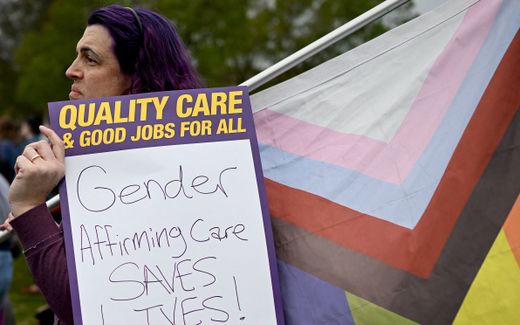Dutch government withdraws transgender bill after pressure

An earlier pride parade in Amsterdam. Photo ANP, Remko de Waal
Western Europe
The Dutch caretaker government decided to withdraw its controversial self-identification transgender bill that was to make it easier for young people to change their legal gender.
Stay up to date with Christian news in Europe? Sign up for CNE's newsletter.
The news was announced on Wednesday by one of the Dutch junior ministers, Teun Struyken.
The official withdrawal consists of several steps and could be completed around August, the government expects, according to the Reformatorisch Dagblad.
In doing so, the caretaker government is responding to repeated calls from the House of Representatives to withdraw the bill. If a law is withdrawn, a subsequent government, which still wishes to introduce the law, has to start the whole legislative process from scratch again. Rapid introduction of self-identification is then out of the question.
The bill, that was announced in 2021, was supposed to make it easier to change gender registration in the official documents. The minimum age of 16 and the required expert statement would be dropped.
With this, the government mainly wanted to support the emancipation of transgender people. However, an evaluation in 2017 of the existing law showed that there were few bottlenecks in practice and that the law was adequate in human rights terms.
At the time of the announcement of the bill, it looked that there would be an easy majority for it. But during the course of the debates, doubt crept in with the larger parties.
A poster campaign was also set up by the group Gender Doubt against the law.
Burden
The House twice called on the cabinet to stop the legislative process. The first time, in April last year, the Cabinet did not act on this call. The minister, who was responsible for the draft at the time, wrote that he wanted an “orderly debate” on the bill. In early April, MP Diederik van Dijk from the Reformed SGP party, therefore, made a second attempt. Again, the motion passed. The cabinet thus finally heeded that call on Wednesday.
Van Dijk welcomes the cabinet's decision. "We cannot burden vulnerable young people with the deception that your gender is a choice. They deserve real help," he said in a first reaction.
“This cabinet is letting transgender people down in an unprecedented way.”
Interest groups Transnetwerk Nederland and COC Nederland reacted furiously in a joint statement on Wednesday. They speak of an “unprecedented step”.
“This cabinet is letting transgender people down in an unprecedented way”, chair Remke Verdegem wrote. “That it is a caretaker cabinet implementing this motion from a small majority in the Lower House, just before elections are due, feels like a stab in our backs”, Verdegem said.
Medical statement
The Netherlands is not the only European country that considered making legal gender change on the basis of self-identification easier. Several countries have already implemented laws for this after 2020. Germany, for example, passed a law in 2024 that allows people to change their gender without having to present an expert's statement and go to court.
The same year, Sweden implemented legislation that allows minors older than 16 to change their gender. Even though they need approval from their parents, they do not have to have an official diagnosis of gender dysphoria.
Spain changed its transgender laws in 2023. Anyone over the age of 12 can change their legal gender. Minors between 12 and 14 years old need the consent of a judge, besides the permission of their parents. Those between 14 and 16 only need their parents to approve. Anyone older than 16 can change their legal gender without a medical statement or anyone's consent.
In Switzerland, people do not need a medical statement to change their legal gender. Since 2022, legal gender change is little more than an administrative action.
Self-identification
Norway has one of the most liberal laws when it comes to transgenderism. Norwegians over 16 can change their legal gender without parental consent. Children as young as six years old can also change their legal gender if their parents approve.
Other countries where legal gender change is quite easy are Belgium, Denmark, Finland, Iceland and Luxembourg. They also introduced self-identification laws, which enable citizens to change their legal gender.
Another remarkable case is Poland where the Supreme Court ruled that legal gender change no longer required parental consent. Until March 2025, everyone, adult or not, needed the permission of their parents to change their legal gender. According to the judge, this regulation was unlawful, because Polish law does not specify a procedure for gender change.
Related Articles










